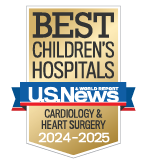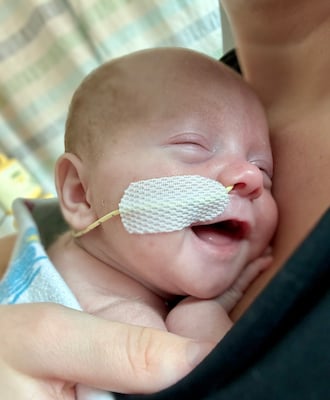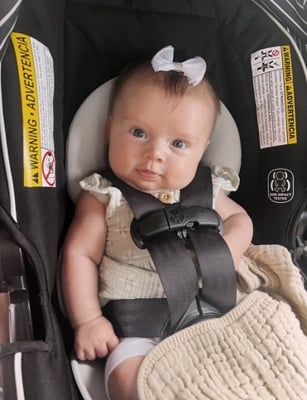Heart Center
Nationally ranked by U.S. News & World Report

Heart Center
Nationally ranked by U.S. News & World Report

The Ward Family Heart Center at Children's Mercy provides comprehensive care for children with all types of heart conditions. Our team of 35 pediatric cardiologists and heart surgeons, together with specially-trained nurses and staff members, work tirelessly to give your child the best possible care.
The size and scope of our program means that we are always ready to care for your child, no matter how rare their condition might be. Even though we care for some of the most complex kids, our survival rates continue to surpass the national average.
Choosing the best heart program for your child
We understand it can be very overwhelming to learn your child has a heart condition. That’s why Children’s Mercy has developed a full-service pediatric cardiology and cardiac surgery team to help you throughout your journey.
Children’s Mercy offers hundreds of health care providers from every pediatric specialty so you can have an expert at your side for every moment of your child’s journey. Because kids with heart problems often have other health conditions, it’s helpful to have all your specialists working together on a comprehensive care plan for your child.

Connect with the Heart Center
Subscribe to the Heart Center newsletter where you will learn about updates from Children's Mercy, upcoming Heart Center events and more!
Families choose Children’s Mercy because of our extensive experience, knowledgeable and personal care providers, and innovative research that translates into results. Our outcomes—the statistics that track how kids do after surgery—are one of the best ways to show how relentlessly our doctors are working to improve the lives of kids with heart conditions. Whether you’re an expecting parent of a baby with a heart condition, a cancer survivor being monitored for long-term side effects of treatment, or an adult who needs continued care for congenital heart disease, Children’s Mercy can help.
Year after year, Children’s Mercy is recognized as one of the top cardiology and heart surgery programs in the nation by U.S. News and World Report. We consider it a privilege to provide care for children and families during some of their most difficult and stressful times.
Our experts come to you through regular visits to our outreach clinics across Kansas and Missouri. This helps ease the burden of frequent travel for families who live outside the Kansas City area.
In addition to the very best medical care, our Thrive program surrounds your whole family with support throughout your journey. Team members from many departments—including Child Life, Financial Counseling, Chaplaincy and more—come together to ensure you have the social and emotional support you need as you care for your child.
Kids with heart conditions often need complex care and close monitoring, which used to mean a long hospital stay was inevitable. But our commitment to research and innovation is making it possible for more families of kids with single-ventricle and complex congenital heart disease to safely live at home between surgeries. Our Ward Family Heart Center uses CHAMP® (Children’s High Acuity Monitoring Program) technology—together with a dedicated support team—to help monitor your child at all times, even when you’re at home.
Powering Children’s Potential
It is one of our main missions to be a part of adding advancement and more scientific knowledge in order to have more and improved ways to treat patients with congenital heart disease.

Through outstanding clinical care, innovation and research, Children’s Mercy Kansas City has become a national leader in pediatric cardiology and cardiac surgery care. In this Powering Children’s Potential video, former Children’s Mercy President and CEO, Paul Kempinski, and Dr. Barnes discuss the many ways the Ward Family Heart Center is improving the health of children with congenital heart disease and helping them fulfill their potential.
Watch the videoClinical Services
Children’s Mercy works with area adult health systems to provide congenital heart defect patients with seamless, continuous, advanced care as they transition to adulthood.
Our Cardiac High Acuity Monitoring Program (CHAMP) is a dedicated, multi-disciplinary team built to meet the needs of some of our most complex patients: babies who are born with single ventricle heart disease and are in the critical inter-stage period between the first and second stages of surgery. These high-risk single ventricle infants and their families receive support with home monitoring provided by the CHAMP team.
This clinic provides early identification and treatment of neurodevelopmental issues that are often found in children with complex heart problems.
Life-saving cancer treatments can sometimes cause unwanted side effects to other organs, including the heart. Children who are undergoing cancer treatment or are cancer survivors can get specialized care from our pediatric cardiologists in this program.
The Cardiovascular Genetics Clinic provides coordinated screening, diagnosis, management, and genetic counseling for genetic heart disease in children. Families will meet with a genetic counselor, geneticist and cardiologist who work as a team to help determine a diagnosis for each child. Common indications seen at the clinic include connective tissue disorders, cardiac arrhythmias, cardiomyopathies, and children with an underlying chromosome disorder or genetic syndrome causing congenital heart disease.
The electrophysiology team manages all types of heart rhythm disorders in children. Our experienced team provides patient care both in the inpatient and outpatient settings.
ECMO (extracorporeal membrane oxygenation) is a treatment used for patients with life-threatening heart and/or lung problems.
Fetal Cardiology services bring potentially lifesaving care to families from the moment of fetal diagnosis, through delivery, and beyond.
The Heart Failure and Transplant team cares for children in every stage of the heart failure and transplant process. We help equip and monitor children with ventricular assist devices (VADs) while they wait for a new heart.
Each year, hundreds of families choose to trust Children’s Mercy with their child’s heart surgery. Our experienced surgical team and support staff take pride in providing the very best care, personalized to each child’s unique needs.
Part of the Transplant Center at Children's Mercy, our Heart Transplant program provides an experienced team of surgeons, cardiologists, nurses and coordinators are specially trained in pediatric heart transplant care.
We will work with you to monitor your child's heart and their condition through outpatient services which might include electrocardiograms (EKG), echocardiograms and more. Learn more about these services.
The Ward Family Heart Center at Children’s Mercy Kansas City is committed to providing outpatient cardiac care close to home for patients in its 150-county service area, from all of Kansas to Western and Southern Missouri.
This program is designed to benefit children who are at an increased risk for early cardiovascular disease (heart attack or stroke) due to abnormal lipid or cholesterol levels and/or a significant family history. Our treatment approach aims to modify lifestyle habits prior to starting medications.
Children with pulmonary hypertension—increased pressure in the vessels going from the heart to the lungs—benefit from our team-based approach to care. Experts in pediatric heart and lung care, including a pulmonologist, cardiologist, and specialized nursing staff, work together to help your family navigate this complex condition.
The single ventricle clinic brings together all types of care providers to improve coordination of care for kids with this complex condition. Our team includes experts from cardiology, hepatology (liver), pulmonology (lungs), pediatric psychology, social work, and nutrition. Together, we take pride in providing the best care for your child, including an extensive evaluation with individualized testing and imaging. We will help your child live life to the fullest and to meet their unique needs as they grow.
Children's Mercy's congenital heart surgeons specialize in reconstructive valve surgery techniques for children and adults. Our team is at the forefront of developing alternative valve therapies that include repairs, reconstructions, and human valve transplants.
Conditions
-
Aortic Atresia
-
Aortic Valve Disease
-
Arrhythmias
-
Arrhythmogenic Right Ventricular Dysplasia
-
Cardiac Masses
-
Cardiomyopathy and Pulmonary Hypertension
-
Chest Pain
-
Congenital Heart Disease
-
Coronary Artery Anomalies
-
Cor Triatriatum
-
Ductal-dependent Heart Lesions
-
Ebstein's Anomaly
-
Endocardial Cushion Defect
-
Heart Failure
-
Heart Transplants (pre- and post-op)
-
Hypoplastic Left Heart Syndrome (HLHS)
-
Hypoplastic Right Heart Syndrome
-
Mitral Valve Disease
-
Pacemakers and Defibrillators
-
Pulmonary Hypertension
-
Pulmonary Stenosis
-
Single Ventricle Anatomy
-
Subaortic Membrane Abnormalities
-
Total Anomalous Pulmonary Venous Return (TAPVR)
-
Tricuspid Atresia
-
Truncus Arteriosus
-
Valvular Heart Disease
-
Vascular Ring
Improving care for kids through research
Research by the Ward Family Heart Center at Children’s Mercy is truly translational, and spans the entire spectrum of medical research from bench to bedside. Multiple disciplines within the Ward Family Heart Center contribute to research in pharmacogenomics, imaging tissue engineering, and outcomes research. Our team is also collaborating with the Genomic Medicine Center to investigate genetic causes of congenital heart disease.
Heart Center Report
Please join us as we share the important progress our team has made—progress that’s resulting in answers for patients and families at Children’s Mercy, and for children around the globe.
Cardiac Patient Family Advisory Council
The Cardiac PFAC supports the highest standard of excellence in cardiac care at Children's Mercy through meaningful collaboration between families and hospital staff.
Stories
Tiny heart, beating strong
Born premature and forced to undergo open-heart surgery at just three months old, this brave boy is now growing into a full-fledged toddler.

Fetal Heart Block: Reese's Story
Taylor and Caleb Jeter's unborn daughter, Reese, was diagnosed with fetal heart block while they were stationed in Germany. They were referred to Children's Mercy Kansas City for specialized care, where a multidisciplinary team managed Reese's condition and performed a successful surgery after her birth. Reese now has a pacemaker and continues to receive ongoing care and monitoring.

Shone’s Complex: Brexley's Story
Brexley, a joyful baby, faced a life-threatening situation at just 18 days old but was saved by quick action from Master Trooper Evan Jacks and expert medical care. Diagnosed with Shone’s Complex, she underwent successful treatments and is now thriving under close medical supervision.

Inside Pediatrics: Ziah's story
Baby Ziah depends upon a passionate team of prenatal and cardiac specialists to help her survive through birth and the heart repairs needed during her first year of life.
Inside Pediatrics: Leah's story
Leah was born with half a heart, and despite several surgeries, it’s failing fast. Cardiac and critical care specialists work to keep her alive, hoping a new heart can be found in time.
CHAMP: Winston's story
Winston Wahlgren has hypoplastic left heart syndrome, or HLHS, a congenital heart defect that requires three heart surgeries to repair. His parents used the CHAMP App, an innovative PC tablet-based application created by Children’s Mercy researchers, to monitor his condition between surgeries.
Call for an appointment
We strongly encourage families to contact our hospital directly to schedule appointments and we request that patients bring relevant medical records and X-rays with them on their first visit.
Patients may be able to to be seen at our outreach locations in Joplin, Mo.; St. Joseph, Mo.; Junction City, Kan.; Garden City, Kan., and Wichita, Kan.
We’ve been blessed by being surrounded by a team of professionals at Children’s Mercy that have encouraged us throughout this entire process. We have gained an extended family that will always be very special to us.
- Heart Center
- Adult Congenital Heart Program
- Cardiac Intensive Care Unit (CICU)
- CHAMP
- Fetal Cardiology Program
- Heart Center Outpatient Services
- Heart Procedures
- Heart Transplant
- Thrive Program
- Congenital Cardiac Surgery Fellowship
- Pediatric Cardiology Fellowship
- Single Ventricle Program
- Meet the Team
- For Providers: Heart Center Connect
